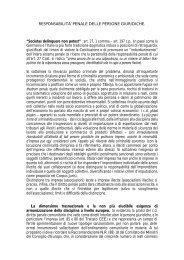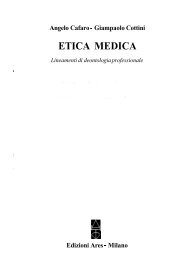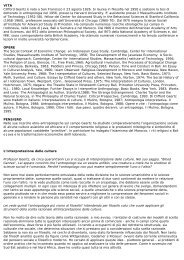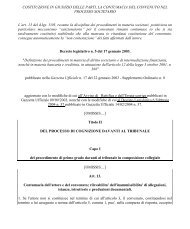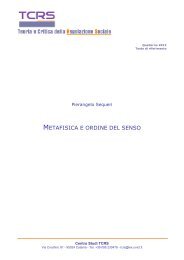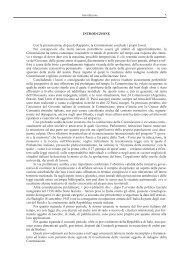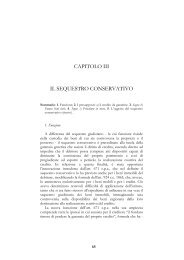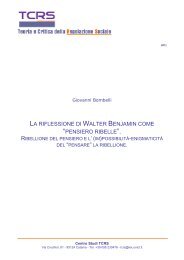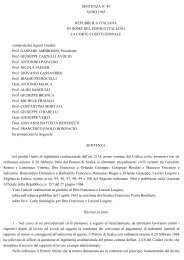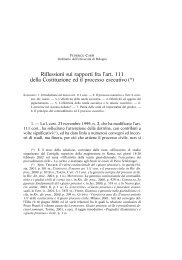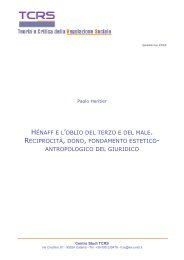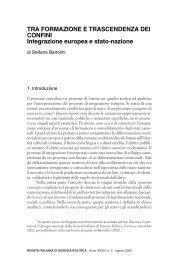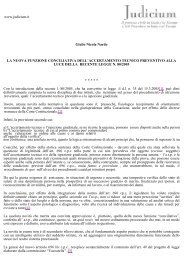- Page 1 and 2:
3/2008
- Page 3 and 4:
FOGLI DI LAVORO per il Diritto inte
- Page 5 and 6:
Presentazione FOGLI DI LAVORO per i
- Page 7 and 8:
FOGLI DI LAVORO per il Diritto inte
- Page 9 and 10:
FOGLI DI LAVORO per il Diritto inte
- Page 11 and 12:
FOGLI DI LAVORO per il Diritto inte
- Page 13 and 14:
FOGLI DI LAVORO per il Diritto inte
- Page 15 and 16:
FOGLI DI LAVORO per il Diritto inte
- Page 17 and 18:
FOGLI DI LAVORO per il Diritto inte
- Page 19 and 20:
FOGLI DI LAVORO per il Diritto inte
- Page 21 and 22:
FOGLI DI LAVORO per il Diritto inte
- Page 23 and 24:
FOGLI DI LAVORO per il Diritto inte
- Page 25 and 26:
FOGLI DI LAVORO per il Diritto inte
- Page 27 and 28:
FOGLI DI LAVORO per il Diritto inte
- Page 29 and 30:
FOGLI DI LAVORO per il Diritto inte
- Page 31 and 32:
FOGLI DI LAVORO per il Diritto inte
- Page 33 and 34:
FOGLI DI LAVORO per il Diritto inte
- Page 35 and 36:
FOGLI DI LAVORO per il Diritto inte
- Page 37 and 38:
FOGLI DI LAVORO per il Diritto inte
- Page 39 and 40:
FOGLI DI LAVORO per il Diritto inte
- Page 41 and 42:
FOGLI DI LAVORO per il Diritto inte
- Page 43 and 44:
FOGLI DI LAVORO per il Diritto inte
- Page 45 and 46:
FOGLI DI LAVORO per il Diritto inte
- Page 47 and 48:
FOGLI DI LAVORO per il Diritto inte
- Page 49 and 50:
FOGLI DI LAVORO per il Diritto inte
- Page 51 and 52:
FOGLI DI LAVORO per il Diritto inte
- Page 53 and 54:
FOGLI DI LAVORO per il Diritto inte
- Page 55 and 56:
FOGLI DI LAVORO per il Diritto inte
- Page 57 and 58:
FOGLI DI LAVORO per il Diritto inte
- Page 59 and 60:
FOGLI DI LAVORO per il Diritto inte
- Page 61 and 62:
FOGLI DI LAVORO per il Diritto inte
- Page 63 and 64:
FOGLI DI LAVORO per il Diritto inte
- Page 65 and 66:
FOGLI DI LAVORO per il Diritto inte
- Page 67 and 68:
FOGLI DI LAVORO per il Diritto inte
- Page 69 and 70:
FOGLI DI LAVORO per il Diritto inte
- Page 71 and 72:
FOGLI DI LAVORO per il Diritto inte
- Page 73 and 74:
FOGLI DI LAVORO per il Diritto inte
- Page 75 and 76:
FOGLI DI LAVORO per il Diritto inte
- Page 77 and 78:
FOGLI DI LAVORO per il Diritto inte
- Page 79 and 80:
FOGLI DI LAVORO per il Diritto inte
- Page 81 and 82:
FOGLI DI LAVORO per il Diritto inte
- Page 83 and 84:
FOGLI DI LAVORO per il Diritto inte
- Page 85 and 86:
FOGLI DI LAVORO per il Diritto inte
- Page 87 and 88:
FOGLI DI LAVORO per il Diritto inte
- Page 89 and 90:
FOGLI DI LAVORO per il Diritto inte
- Page 91 and 92:
FOGLI DI LAVORO per il Diritto inte
- Page 93 and 94:
FOGLI DI LAVORO per il Diritto inte
- Page 95 and 96:
FOGLI DI LAVORO per il Diritto inte
- Page 97 and 98:
FOGLI DI LAVORO per il Diritto inte
- Page 99 and 100:
FOGLI DI LAVORO per il Diritto inte
- Page 101 and 102:
FOGLI DI LAVORO per il Diritto inte
- Page 103 and 104:
FOGLI DI LAVORO per il Diritto inte
- Page 105 and 106:
FOGLI DI LAVORO per il Diritto inte
- Page 107 and 108:
FOGLI DI LAVORO per il Diritto inte
- Page 109 and 110:
FOGLI DI LAVORO per il Diritto inte
- Page 111 and 112:
FOGLI DI LAVORO per il Diritto inte
- Page 113 and 114:
FOGLI DI LAVORO per il Diritto inte
- Page 115 and 116:
FOGLI DI LAVORO per il Diritto inte
- Page 117 and 118:
FOGLI DI LAVORO per il Diritto inte
- Page 119 and 120:
FOGLI DI LAVORO per il Diritto inte
- Page 121 and 122:
FOGLI DI LAVORO per il Diritto inte
- Page 123 and 124:
FOGLI DI LAVORO per il Diritto inte
- Page 125 and 126:
FOGLI DI LAVORO per il Diritto inte
- Page 127 and 128:
FOGLI DI LAVORO per il Diritto inte
- Page 129 and 130:
FOGLI DI LAVORO per il Diritto inte
- Page 131 and 132:
FOGLI DI LAVORO per il Diritto inte
- Page 133 and 134:
FOGLI DI LAVORO per il Diritto inte
- Page 135 and 136:
FOGLI DI LAVORO per il Diritto inte
- Page 137 and 138:
FOGLI DI LAVORO per il Diritto inte
- Page 139 and 140:
FOGLI DI LAVORO per il Diritto inte
- Page 141 and 142:
FOGLI DI LAVORO per il Diritto inte
- Page 143 and 144:
FOGLI DI LAVORO per il Diritto inte
- Page 145 and 146:
FOGLI DI LAVORO per il Diritto inte
- Page 147 and 148:
FOGLI DI LAVORO per il Diritto inte
- Page 149 and 150:
FOGLI DI LAVORO per il Diritto inte
- Page 151 and 152:
FOGLI DI LAVORO per il Diritto inte
- Page 153 and 154:
FOGLI DI LAVORO per il Diritto inte
- Page 155 and 156:
FOGLI DI LAVORO per il Diritto inte
- Page 157 and 158:
FOGLI DI LAVORO per il Diritto inte
- Page 159 and 160:
FOGLI DI LAVORO per il Diritto inte
- Page 161 and 162:
FOGLI DI LAVORO per il Diritto inte
- Page 163 and 164:
FOGLI DI LAVORO per il Diritto inte
- Page 165 and 166:
FOGLI DI LAVORO per il Diritto inte
- Page 167 and 168:
FOGLI DI LAVORO per il Diritto inte
- Page 169 and 170:
FOGLI DI LAVORO per il Diritto inte
- Page 171 and 172:
FOGLI DI LAVORO per il Diritto inte
- Page 173 and 174:
FOGLI DI LAVORO per il Diritto inte
- Page 175 and 176:
FOGLI DI LAVORO per il Diritto inte
- Page 177 and 178:
FOGLI DI LAVORO per il Diritto inte
- Page 179 and 180:
FOGLI DI LAVORO per il Diritto inte
- Page 181 and 182:
FOGLI DI LAVORO per il Diritto inte
- Page 183 and 184:
FOGLI DI LAVORO per il Diritto inte
- Page 185 and 186:
FOGLI DI LAVORO per il Diritto inte
- Page 187 and 188:
FOGLI DI LAVORO per il Diritto inte
- Page 189 and 190:
FOGLI DI LAVORO per il Diritto inte
- Page 191 and 192:
FOGLI DI LAVORO per il Diritto inte
- Page 193 and 194:
FOGLI DI LAVORO per il Diritto inte
- Page 195 and 196:
FOGLI DI LAVORO per il Diritto inte
- Page 197 and 198:
FOGLI DI LAVORO per il Diritto inte
- Page 199 and 200:
FOGLI DI LAVORO per il Diritto inte
- Page 201 and 202:
FOGLI DI LAVORO per il Diritto inte
- Page 203 and 204:
FOGLI DI LAVORO per il Diritto inte
- Page 205 and 206:
FOGLI DI LAVORO per il Diritto inte
- Page 207 and 208:
FOGLI DI LAVORO per il Diritto inte
- Page 209 and 210:
FOGLI DI LAVORO per il Diritto inte
- Page 211 and 212:
FOGLI DI LAVORO per il Diritto inte
- Page 213 and 214:
FOGLI DI LAVORO per il Diritto inte
- Page 215 and 216:
FOGLI DI LAVORO per il Diritto inte
- Page 217 and 218:
FOGLI DI LAVORO per il Diritto inte
- Page 219 and 220:
FOGLI DI LAVORO per il Diritto inte
- Page 221 and 222:
FOGLI DI LAVORO per il Diritto inte
- Page 223 and 224:
FOGLI DI LAVORO per il Diritto inte
- Page 225 and 226:
FOGLI DI LAVORO per il Diritto inte
- Page 227 and 228:
FOGLI DI LAVORO per il Diritto inte
- Page 229 and 230:
FOGLI DI LAVORO per il Diritto inte
- Page 231 and 232:
FOGLI DI LAVORO per il Diritto inte
- Page 233 and 234:
FOGLI DI LAVORO per il Diritto inte
- Page 235 and 236:
FOGLI DI LAVORO per il Diritto inte
- Page 237 and 238:
FOGLI DI LAVORO per il Diritto inte
- Page 239 and 240:
FOGLI DI LAVORO per il Diritto inte
- Page 241 and 242:
FOGLI DI LAVORO per il Diritto inte
- Page 243 and 244:
FOGLI DI LAVORO per il Diritto inte
- Page 245 and 246:
FOGLI DI LAVORO per il Diritto inte
- Page 247 and 248:
FOGLI DI LAVORO per il Diritto inte
- Page 249 and 250: FOGLI DI LAVORO per il Diritto inte
- Page 251 and 252: PROCÉDURE FOGLI DI LAVORO per il D
- Page 253 and 254: FOGLI DI LAVORO per il Diritto inte
- Page 255 and 256: FOGLI DI LAVORO per il Diritto inte
- Page 257 and 258: FOGLI DI LAVORO per il Diritto inte
- Page 259 and 260: FOGLI DI LAVORO per il Diritto inte
- Page 261 and 262: FOGLI DI LAVORO per il Diritto inte
- Page 263 and 264: FOGLI DI LAVORO per il Diritto inte
- Page 265 and 266: FOGLI DI LAVORO per il Diritto inte
- Page 267 and 268: FOGLI DI LAVORO per il Diritto inte
- Page 269 and 270: FOGLI DI LAVORO per il Diritto inte
- Page 271 and 272: FOGLI DI LAVORO per il Diritto inte
- Page 273 and 274: FOGLI DI LAVORO per il Diritto inte
- Page 275 and 276: FOGLI DI LAVORO per il Diritto inte
- Page 277 and 278: FOGLI DI LAVORO per il Diritto inte
- Page 279 and 280: FOGLI DI LAVORO per il Diritto inte
- Page 281 and 282: FOGLI DI LAVORO per il Diritto inte
- Page 283 and 284: SUMMARY FOGLI DI LAVORO per il Diri
- Page 285 and 286: FOGLI DI LAVORO per il Diritto inte
- Page 287 and 288: FOGLI DI LAVORO per il Diritto inte
- Page 289 and 290: FOGLI DI LAVORO per il Diritto inte
- Page 291 and 292: FOGLI DI LAVORO per il Diritto inte
- Page 293 and 294: FOGLI DI LAVORO per il Diritto inte
- Page 295 and 296: FOGLI DI LAVORO per il Diritto inte
- Page 297 and 298: FOGLI DI LAVORO per il Diritto inte
- Page 299: FOGLI DI LAVORO per il Diritto inte
- Page 303 and 304: FOGLI DI LAVORO per il Diritto inte
- Page 305: FOGLI DI LAVORO per il Diritto inte



